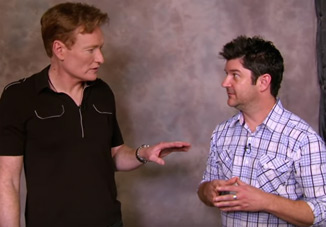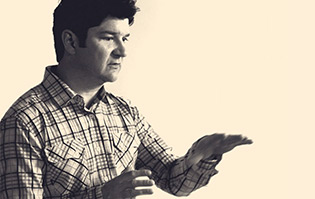 Naturalist John Burroughs once said, “Leap, and the net will appear.”
Naturalist John Burroughs once said, “Leap, and the net will appear.”It’s a phrase that commercial acting coach Killian McHugh lives by. For more than 10 years, Killian has guided actors through the often-arduous process of commercial auditions.
Killian believes that commercial actor training is about more than just performance. It is a complex mechanism where an actor must understand both the creative and business expectations of the client. But how exactly is this achieved?
Recently, we had the opportunity to speak with Killian about the do's and don’ts of commercial auditions.
So, without further adieu, lights, camera and action!
“One day, after doing a group explanation, a casting director told me you should get into teaching,” Killian remembers. “Because in her view, I was basically giving everyone an acting workshop during my sessions anyways.”
That’s when Killian decided to leave his position as casting director and create Killian's Workshop. With classes ranging from foundational skills to actor branding, Killian’s hope was to create an all-encompassing acting workshop focused on demystifying the casting machine.
Since its founding, the workshop has educated and has helped thousands of students book acting jobs. It has also made Killian a trusted acting coach in the commercial casting industry. His memorable appearance on The Conan O’Brien Show hilariously explores how even the most challenged actors can benefit from Killian’s methods.
“I say this in every class, the commercial world is a listening test more than anything,” Killian says. “You’re going to be in the shot for 2, 8, maybe 30 seconds tops. I mean, the commercial director is pretty sure they can get a performance out of a pencil for 2 seconds. But when it comes to acting roles, they’re wondering how is my day going to be with this individual on set. So, when the casting director during your fist call audition gives you direction, or the director at your callback gives you direction, don’t interpret that direction. Do exactly what he or she says.”
For Killian, it’s important to find a balance between craft, and highlighting the skills that make your brand worth investing in. Of course, strong acting is what any casting director desires. But just as important, is an ability to listen and take direction well.
One of the major mistakes Killian sees in an actor's preparation is a lack of client familiarity. It is his belief that one must have a firm grasp of the business and brand one is auditioning for.
“I tell my students that what we’re doing is not art, it’s sales,” Killian says. “And so, you have to understand that financially there’s a lot at stake for the person who wrote the commercial. As actors, we come from the art world, and our theatrical choices are not necessarily correct in the commercial world. During casting calls, you have to divorce yourself from your actor ego. Every choice you make, whether it’s a funny button, or something more serious, cannot be implemented just for the hell of it. It has to all tie into the client’s needs and the client’s current campaign. In the end, every decision you make has to be from the point-of-view of the client.”
By neglecting this aspect, Killian feels that actors are sabotaging themselves. Thus, his acting workshop makes it a point to zero in and dissect this vital casting element.
Killian explains that because of the time constraints of commercials, an audience needs to get an immediate idea of character personality. “It’s all about knowing who you are,” Killian says. “Commercial characters are stereotypical to a degree. I’m not saying a negative stereotype, but they do possess familiar character traits. You see, commercials have no time so they have to read instantly. An actor needs to come across as instant slacker guy, instant soccer mom, etc. When you look in the mirror, you have to instantly know who you are. That’s very important.”
And for Killian, the details of commercial acting roles are vital. In his experience, the right pair of glasses or haircut -- depending on the role -- can truly influence an actor’s future in the medium.
“In the theatrical world you can be lots of people, but in the commercial world it’s different,” Killian says. “I remember talking to a friend of mine years ago when I was still acting and going out for commercial parts. We were both in the same age category and he was booking all the acting jobs. I asked him, what are you doing? God, you’re in everything! He said, honestly, I just threw on a cardigan. Ever since then, I’ve booked every dad role. You see, we’re not looking for range in commercial auditions. This isn’t Daniel Day Lewis in My Left Foot. It’s about presenting a persona that comes across instantly.”
Killian is well aware of the fear actors have of being typecast. But in the commercial world, these characters operate a bit differently. Instead of resisting a character trait, Killian encourages an actor to investigate its potential. For him, it’s important to determine whether this trait is essential to building and promoting one's brand.
“Now, I get a bit irritated in the commercial world when an actor says I’m typecast,” Killian says. “Of course it’s different if you’re being exploited in some way, or used to promote a derogatory stereotype. That’s not what I’m talking about, and should not be tolerated. What I’m talking about is when an actor denies an attribute that makes them valuable to a commercial audience. That becomes a problem.”
In Killian’s opinion, it’s more advantageous to work with one’s physical attributes than fight against them. That’s what’s going to be more successful during casting calls. “For example, let’s say Marilyn Monroe had decided to do Shakespeare,” Killian says. “She’s through with Hollywood and wants to be a serious actor. Well, I’m sorry Marilyn, but look at you. This is your brand. Your brand is that you’re the sexiest woman in the world, and that’s what people want. I say in class, why fight to swim upstream when you can float down. Now, of course this doesn’t mean Marilyn could never be a serious actor. But she would have to make some changes. She’d have to get rid of the platinum blonde hair and all the makeup. Would she be willing to do that? I mean, for the people casting talent, they’d say you’ve got a pretty sweet thing going Marilyn. I would stick with that. Sure, your brand might feel like a stereotype, but in the commercial world, it’s the difference between getting acting jobs and not. “
Ultimately for Killian, it’s about understanding the medium you’re auditioning for. In an arena where clients are looking for a persona that instantly clicks with an audience, correctly utilizing a unique trait is essential.
“In my acting workshop, I teach the big picture,” Killian says. “For an actor, it’s not about focusing on this one booking. It’s about cultivating the emotions that led to this moment, and can carry them into the future. Acting jobs, no matter the medium, take a tremendous emotional toll on a human being. It’s something I’ve tried to always remain conscious of.” This conscious approach to auditions was not always present for Killian. In a medium where profit often takes precedence over performance, it took a one-on-one session to open his eyes to the matter.
“I remember the first time an actor came to me for a private commercial session and she cried in the room,” he continues. “I was very taken aback by it. In my head I was thinking, geez what’s going on here? I mean, they’re just commercial auditions. At the time I didn’t realize that everything is connected and she was frustrated about these connections. Frustrated about theatrical acting and not getting parts. It was then that I realized this is more than just a commercial process. I have to dig deeper and take into consideration everything an actor goes through. I need to make sure I keep this in mind every time I open my mouth to teach.”
Luckily for his students, and the commercial acting community, Killian shows no signs of slowing down.

